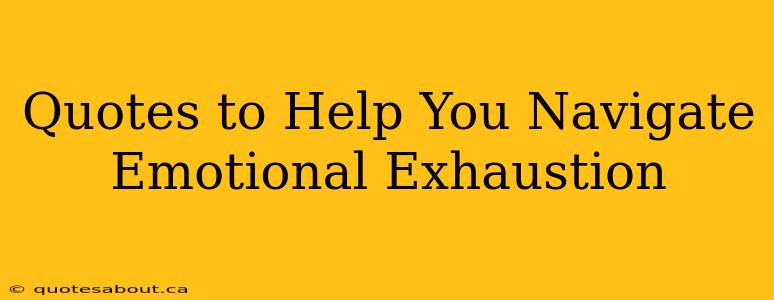Emotional exhaustion. The phrase itself feels heavy, doesn't it? It's that overwhelming sense of depletion, the feeling that you've poured out every ounce of emotional energy and have nothing left to give. It's a state many of us experience, particularly in today's fast-paced and demanding world. While professional help is crucial when dealing with prolonged or severe emotional exhaustion, sometimes a simple, insightful quote can offer a moment of solace, perspective, and even a renewed sense of strength. This post explores powerful quotes that can help you navigate this challenging experience. We'll also delve into frequently asked questions surrounding emotional exhaustion to offer a comprehensive understanding of this pervasive issue.
Understanding Emotional Exhaustion: What is it?
Before we dive into the quotes, let's briefly define emotional exhaustion. It's not simply feeling tired; it's a deeper state of depletion that impacts your emotional, mental, and often physical well-being. It's characterized by feelings of emptiness, hopelessness, irritability, cynicism, and a diminished capacity to empathize or care. It's a warning sign that your emotional reserves are severely depleted and require replenishment.
Inspirational Quotes for Emotional Resilience
Here are some powerful quotes that can offer comfort and guidance during times of emotional exhaustion:
-
"The oak sleeps in the acorn; the bird waits in the egg; and in the highest vision of the soul a waking angel stirs. Dreams are the seedlings of realities." - James Allen: This quote reminds us that even in the depths of exhaustion, there is potential for renewal and growth. Our dreams and visions hold the seeds of future strength and resilience.
-
"What lies behind you and what lies in front of you, pales in comparison to what lies inside of you." - Ralph Waldo Emerson: This quote focuses on your inner strength and resilience. Your capacity to overcome emotional exhaustion resides within you.
-
"The best and most beautiful things in the world cannot be seen or even touched - they must be felt with the heart." - Helen Keller: This emphasizes the importance of self-compassion and emotional intelligence. Nurturing your heart and emotional well-being is crucial for recovery.
-
"The difference between ordinary and extraordinary is that little extra." - Jimmy Johnson: This quote encourages small, consistent steps towards self-care and recovery. Even small acts of self-compassion can make a significant difference.
-
"Be patient with yourself. Self-growth is tender; it's holy ground. There's no greater investment." - Stephen Covey: This emphasizes the importance of patience and self-compassion during the healing process.
Addressing Common Questions about Emotional Exhaustion
Many people have questions about emotional exhaustion. Let's address some of the most common ones:
How do I know if I'm experiencing emotional exhaustion?
Recognizing the signs is the first step. Symptoms can include persistent fatigue, irritability, cynicism, feeling overwhelmed, difficulty concentrating, sleep disturbances, physical ailments (like headaches or stomach problems), and withdrawal from social activities. If you're experiencing several of these symptoms consistently, it's time to seek support.
What causes emotional exhaustion?
Several factors can contribute to emotional exhaustion, including prolonged stress, traumatic events, chronic illness, demanding work or personal relationships, lack of self-care, and significant life changes.
How can I recover from emotional exhaustion?
Recovery involves a multi-faceted approach. Prioritizing self-care, establishing healthy boundaries, engaging in activities you enjoy, practicing mindfulness or meditation, seeking professional help (therapy, counseling), and building a strong support network are all crucial steps.
Is emotional exhaustion a serious condition?
Yes, if left unaddressed, emotional exhaustion can lead to more serious mental health conditions like burnout, depression, and anxiety. Seeking professional help is important for diagnosis and effective treatment.
What are some self-care strategies to prevent emotional exhaustion?
Prioritizing regular exercise, adequate sleep, a balanced diet, practicing mindfulness and relaxation techniques, spending time in nature, pursuing hobbies, and maintaining healthy relationships are effective preventative measures.
Conclusion: Finding Strength in the Face of Exhaustion
Emotional exhaustion is a challenging experience, but it's not insurmountable. By understanding its causes, recognizing its symptoms, and actively engaging in self-care strategies, you can navigate this difficult period and emerge stronger and more resilient. Remember the power of these quotes and the importance of seeking professional help when needed. Your emotional well-being is paramount.

